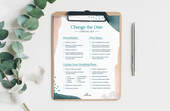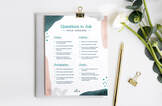| Couples around the world are making the hard decision to delay their wedding date, and I absolutely understand the heartache that comes with such a choice. It’s okay to grieve what’s lost and take time for you, but remember that you’re not alone — lean on your friends, family, and vendors as you begin your journey to plan your new wedding date. First thing’s first! You want to notify everyone of your decision. Start with your wedding party and family — they’ll be eager to support you and may help you send updates to the rest of your guests. Even if you don’t have a new date chosen, it’s important to notify all of your guests that the original plan has changed. They’ll be relieved to know they can safely celebrate your special day at another time. Once your guests are set, call your vendors to confirm that your date is changing. Review your contracts to see what their policies are for rescheduling your wedding, then clarify this policy with each vendor. Many are waiving fees for rescheduled dates and want to help you celebrate your dream wedding — just make sure you get any contract updates in writing to keep everyone on the same page. Your wedding planner will be a huge help in this process. Now that everyone knows the plan is changing, it’s time to get to planning. Decide which vendor is most important to you — this will likely be your venue, so call them first to discuss what dates are available. You may have a tough time getting a Saturday date, but it never hurts to ask! Once you’ve settled on a few options, it’s time to call the rest of your vendors and finalize a date. There’s a chance you won’t be able to keep all of your vendors. In this case, you likely won’t get your deposit back. Keep track of these additional fees and expenses so you can maintain an accurate budget as you plan. After a lot of phone calls and organizing, you officially have a new wedding date — congratulations! You can send out your new invites and enjoy the coming months knowing that you still get to marry the love of your life, and you have even more time to prepare your perfect wedding. -By Guest Writer Briana Marvell, for Zola.com. can be a great resource for change-the-date-cards and anything else you need to plan your wedding. You can see their full guide here. | Click below to download the Printable Change the Date Checklist
Click the video to view sample templates. Click below to download them.
Click below to download the "Questions to Ask" checklist.
| ||||||
|
Today is May 4, 2020. Currently, the Asheville area is under a Stay at Home order that allows only essential business and travel, and restricts gatherings of more than 10 people, even on private property, unless they are all members of the same family. Our Governor, Roy Cooper, is planning to begin to ease these restrictions in three phases over the next three months, as long as our infection rates continue to decline.
What does this mean for events? I have researched state and local government sites, and scanned the blogs of our national event planning organizations, including the Event Safety Alliance, NACE, the Natl Restaurant Association, the Convention Management Association, and others, to come up with an answers. Here is my summary of what the current thinking is nationally: Phase 1: May. Events still restricted to 10 people or less. Attendees must wash hands, avoid physical contact, stay 6 feet apart, and face coverings highly recommended but not required. Some state, local, and federal parks may reopen. No food or drink service at events. Current restrictions on interstate travel still in effect, with travelers required to self-quarantine for 2 weeks if they have come from out of state or out of the country. Hotels and similar lodging may re-open under strict capacity guidelines. Elevators limited to 1 at a time. Strict sanitization with approved anti-viral products required before, during, and after event. Phase 2: June. Gatherings of up to 25 people are allowed (in some cases, up to 25% of capacity). Restaurants and venues may reopen, but capacity is limited. Event permits may be required. Tables must be spaced 6 feet apart, with no more than 6 per table, chairs spread out, no bar service, no buffets, and all food and drink must be delivered table side by workers with gloves and masks, so plated or boxed meals are ideal. Use of disposable dishes, flatware, and glassware required. Bottled or canned beverages preferred over open containers. Trash cans must use liners, and be emptied frequently; Step cans preferred. Linens must be laundered in hot water after every event, and all surfaces, including chairs, cleaned. Workers must stay 6 feet apart in the kitchen and prep areas. Keep staff/guest contact to a minimum, e.g., once to deliver food to table, once to replenish, and once to bus, after guests have left. Elevators may carry up to 2 people. Ubers, limos, shuttles and buses must limit the number of riders. Guests should enter and exit events through different doors, or in phases. The same with suppliers, and vendors. Guest books, photo booths, bars, self-serve drink stations, and other activity stations where people might line up are discouraged, unless a line management system that keeps people 6 feet apart is used. A check-in station is strongly encouraged, with guests signing their name and contact information in case later tracing is needed. (Possibly: Have guests answer a few screening questions, and turn those away who are sick or who have travelled from a hot spot. Temperature checks optional for guests, but not for staff.) Have hand sanitizer, alcohol wipes, and masks for guests who want them. For ceremonies, participants should walk single-file. All venues and vendors involved with the event are encouraged to have general liability insurance in case of an outbreak traced to the event. (Some companies are dropping coverage for pandemics; read your policy carefully and shop around.) Hosts should likewise have event insurance that covers an outbreak. Phase 3: July. Gatherings of up to 50 people (or 50% of capacity) allowed, with the same restrictions as before. Special event permits may be required, not just for alcohol. Bars may reopen, but there should be more servers per guest (currently, one bartender per 50 people is recommended), no lines at the bar, strict cleanliness must be adhered to, servers must wear gloves, and bottled or canned drinks preferred over open containers. Self-service food or drinks still discouraged. Elevators may carry up to 4 people. More people allowed in buses and shuttles. Staff and vendor safety training mandated. With Covid-19 still active, hand washing, hand sanitizer, no physical contact, and social distancing still required. Salons may re-open. Air BnB/VRBO's may reopen. Hotels can take more guests. Fewer restrictions on interstate travel, except for those traveling from hot spots. International travel still discouraged. Phase 4 (August - December) Gatherings of up to 100 people allowed, with same restrictions as in the first 3 phases. Hotels, restaurants and bars may go up to 75% capacity. Local authorities may require inspections or more conditions to issue permits for events, especially assurance that the venue is adhering to strict sanitation protocols. Reusable china, flatware and glassware may be used again, but MUST be run through a sanitizing dishwashing machine. Travel and lodging restrictions eased. Phase 4 restrictions may be extended up to 2 years if there if the percentage of new infections does not decline sufficiently. A surge in the percent of new cases may trigger a return to an earlier phase. Phase 5: The Future. (These is conjecture based on my research.) 100% capacity returns, but the concept of capacity changes. Safety inspections may move from the Fire Marshal's office to a new authority, who will determine capcacity based not only on safety in case of emergency, but also on preventing transmission of infectious diseases. Possibly, staff, vendors, and attendees must provide proof that they are Covid-19 free (based on an antibody test.) OSHA requires safety and health training for anyone who comes into contact with the public. Stricter Serv-Safe standards, and new standards for bartenders. Suppliers offer more anti-microbial products. Increased emphasis on healthy indoor air, with new types of filters for HVAC systems, humidity controls, and increased fresh air intake. Businesses closed on Sunday for Deep Clean Day. A number of lawsuits related to the Coranavirus Outbreak and the management of it surface. Supreme Court determines whether or not a pandemic is a fource majeure event or not. As a result, changes in event insurance and general liability occur. Vendors require clients to turn in head counts earlier, so they can assure numbers match what has been approved. Smaller events strongly encouraged, with discounts for weekday events and events under 50 people. Outdoor venues and those with lots of windows become even more popular. Stricter rules on tented events, with sides discouraged. Inspection may be required for tents. Handshakes, fist-bumps, kissing, hugs, and high-fives go the way of the dinosaurs :( Please comment if you are aware of additional rules that are coming down the pipeline! |
AuthorMiss Ellie is the perfectly proper wedding planner to whom we all turn for wedding planning advice. To ask a question, just click the email button at the top of the page, or leave a comment and she will respond. Archives
November 2020
|




 RSS Feed
RSS Feed
